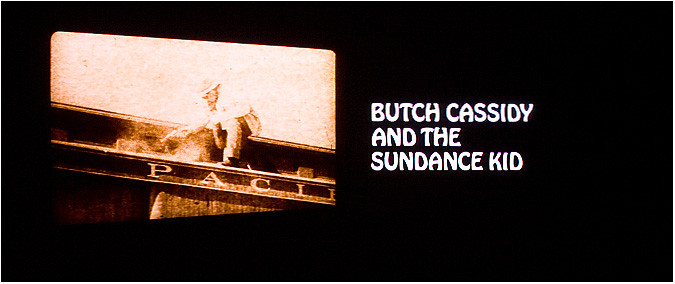
It's amazing, actually, how little really happens in this film. We meet them over a card game, they ride back to their gang, deal with a would-be usurper, follow through with the usurper's ambitious plan to rob the same bank train twice, get busted the second time, an extended chase across the Old West, flight to Bolivia, a little bit of bank robbin' until their pursuers track them down, attempts at going straight that end in a bloodbath, a little bit more robbin', then a final showdown. That may sound like a lot, but it's almost literally every moment in the story. A side story involving Sundance's girl Etta and a couple of short-lived celebrations in a brothel are all I left out. Most of the story is made of extended sequences of Butch and Sundance arguing and running, or montage sequences that push us along through time as things go well for them. In fact, the better things are going the more likely the script is to fastforward through their lives -- to such a degree that the most hopeful, safe and joyous time they spend is reduced to a montage of sepia-toned stills like some Old West music video. (And don't get me started on the soundtrack; aside from the eerie main title theme I pretty much think all the music here is as absurd and tonally counterproductive as the font in the title sequence, seen above.)
And this is famously and rightfully a film known for its screenplay. It's The Film known for its screenplay to some people, since it's William Goldman. The script, though, I must admit -- it's pretty brilliant. The dialogue is so easy and so telling, the characters so distinct and likable and unshowy, and the action so tight and well-paced, there is nothing to complain about at all in here. I've seen it a dozen times and still, each time, the dialogue (and Newman's and Redford's easy delivery) just sparks.
I think there's something to the fact that most of the big moments in this are outside our heroes' control, that this is a story of two people who've been in charge of their lives for a long time and are gradually losing that control. They never give up, and they keep trying their old tricks with less and less success, to the very end -- because what are you going to do? First their gang tries to turn on them, then the train companies are smarter than them (and meaner than them), then the hunters are smarter than them (and meaner than them), and eventually they are simply out of options. Etta sees it, and duly leaves them. Their friend the old sheriff sees it, and refuses to help them. Even Sweetface "the lying son of a bitch" is forced to see it and turns on them as quick as he can. It's not a world for good-old bank robbers anymore, with the organization of civilization moving in on them from all sides. And to the end, Butch and Sundance refuse to recognize this, dreaming of escaping to Australia -- of repeating the very same pipedream leap of faith that brought them to Bolivia in the first place. Every step of the story, they are backed to the edge of a cliff, and charming Butch and stalwart Sundance, they just keep jumping off. Right to the very last. Whether or not they can swim, or shoot, or speak Spanish.
I'm pretty sure there's a bold political read to this, and an easy existentialist one. But I'm not writing thesis papers; I'm just digging shallowly into great films while I rearrange and trim words out of scripts so I can make my own.

No comments:
Post a Comment